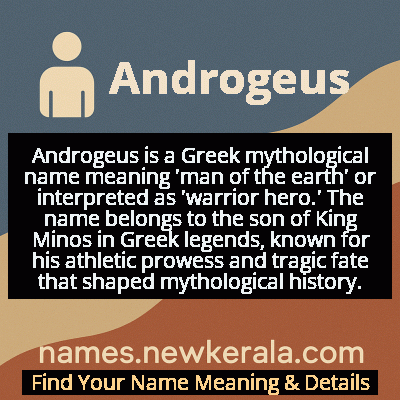Androgeus Name Meaning & Details
Origin, Popularity, Numerology Analysis & Name Meaning of Androgeus
Discover the origin, meaning, and cultural significance of the name ANDROGEUS. Delve into its historical roots and explore the lasting impact it has had on communities and traditions.
Name
Androgeus
Gender
Male
Origin
Greek
Lucky Number
5
Meaning of the Name - Androgeus
Androgeus is a Greek mythological name meaning 'man of the earth' or interpreted as 'warrior hero.' The name belongs to the son of King Minos in Greek legends, known for his athletic prowess and tragic fate that shaped mythological history.
Androgeus - Complete Numerology Analysis
Your Numerology Number
Based on Pythagorean Numerology System
Ruling Planet
Mercury
Positive Nature
Adventurous, dynamic, curious, and social.
Negative Traits
Restless, impatient, inconsistent, prone to indulgence.
Lucky Colours
Green, white.
Lucky Days
Wednesday.
Lucky Stones
Emerald.
Harmony Numbers
1, 3, 9.
Best Suited Professions
Sales, marketing, travel, entertainment.
What People Like About You
Versatility, charisma, adventurous spirit.
Famous People Named Androgeus
Androgeus of Crete
Mythological Hero
Son of King Minos whose death led to Athenian tribute of youths to the Minotaur
Androgeus (Virgil's Aeneid)
Mythological Warrior
Trojan warrior featured in Virgil's epic poem about the founding of Rome
Androgeus (Historical Reference)
Ancient Noble
Minor historical figure occasionally mentioned in classical Greek texts
Name Variations & International Equivalents
Click on blue names to explore their detailed meanings. Gray names with will be available soon.
Cultural & Historical Significance
The name Androgeus represents the intersection of athletic prowess, political consequence, and tragic fate in ancient Greek culture. His story served as both a cautionary tale about the dangers of exceptional talent and a foundational element in the Theseus-Minotaur myth that explained Athenian-Cretan relations in mythological terms. The cultural impact extends to Roman literature, where Virgil references another Androgeus in the Aeneid, demonstrating the name's persistence in classical tradition as representing warrior nobility and tragic destiny. The name embodies the Greek concept of how individual actions ripple through society, affecting entire civilizations and generations.
Extended Personality Analysis
Individuals named Androgeus are typically associated with traits of exceptional capability, competitive spirit, and tragic nobility. Drawing from the mythological figure's athletic prowess and untimely demise, the name suggests someone with natural talents that set them apart from peers, often excelling in physical or intellectual competitions. There's an inherent sense of destiny and consequence—that great abilities come with great risks or responsibilities. The personality carries elements of classical heroism mixed with vulnerability, suggesting someone who might achieve remarkable success but faces significant challenges or opposition.
Secondary traits include leadership qualities, determination, and a certain gravitas that commands respect. However, there's also an undercurrent of potential tragedy or sacrifice, implying that those bearing this name may face situations where their talents put them in dangerous positions. The personality combines athletic vigor with intellectual depth, reflecting the classical Greek ideal of a balanced individual who excels in both mind and body. There's often a sense of historical weight and mythological resonance that influences how others perceive and interact with someone carrying this ancient, storied name, creating expectations of both exceptional achievement and the burdens that accompany it.
Modern Usage & Popularity
In contemporary times, Androgeus remains an exceptionally rare name, primarily used by classical scholars, mythology enthusiasts, or parents seeking a distinctive name with deep historical roots. Its usage is almost exclusively limited to Greek communities or families with strong connections to classical studies. The name has never appeared in popular baby name registries and maintains an academic, almost archaeological quality in modern naming practices. Recent trends toward unique mythological names have generated slight interest, but the name's complexity and tragic mythological associations have prevented widespread adoption. It occasionally appears in creative works or as a character name in historical fiction, but as a given name for living individuals, it remains a curiosity rather than a trend, with usage likely numbering in the dozens worldwide rather than hundreds or thousands.
Symbolic & Spiritual Meanings
Symbolically, Androgeus represents the intersection of exceptional talent and tragic fate—the classical concept that great abilities often come with corresponding vulnerabilities or dangers. The name embodies the Greek philosophical idea of hubris and its consequences, where outstanding achievement can provoke envy or divine retribution. It also symbolizes the connection between individual action and collective consequence, as the mythological Androgeus's death triggered events affecting entire civilizations. The name carries connotations of sacrificial nobility, where one person's fate determines the destiny of many, reflecting ancient beliefs about causality and cosmic balance. Additionally, it represents the athlete-hero archetype—physical perfection combined with mortal limitation—serving as a reminder of human excellence within the boundaries of fate and mortality, and the inevitable connection between personal glory and broader historical impact.

